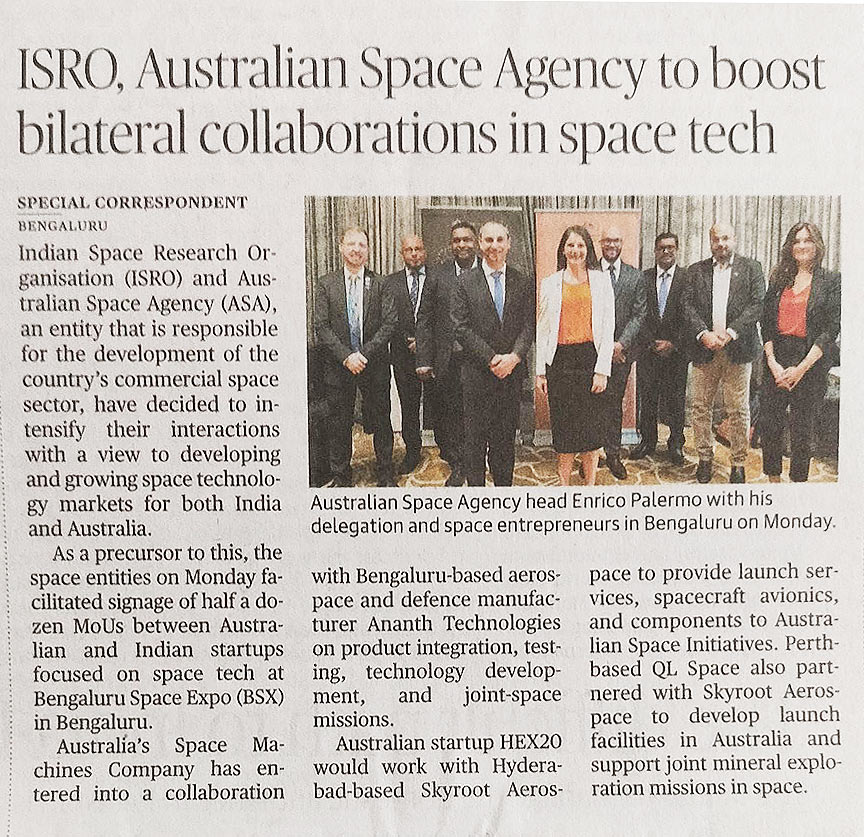
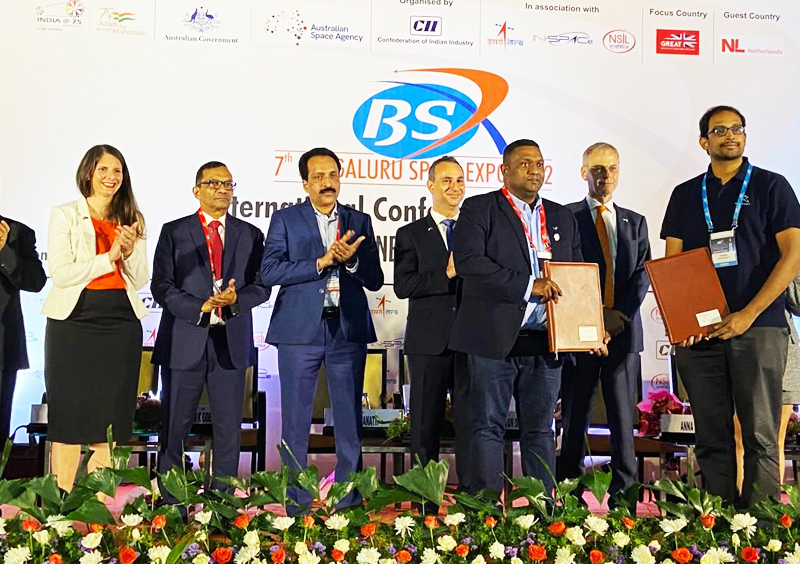
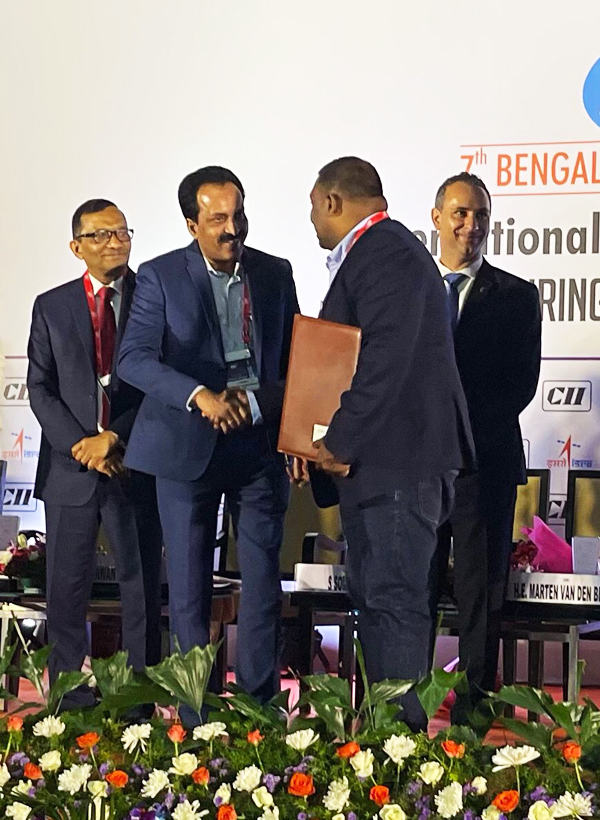



Australia and India signed six new industry-to-industry memorandums for collaboration, with the aim to boost commercial space ties, at Bengaluru Space Expo (BSX).
The Australian delegation was led by the head of the Australian Space Agency (ASA), Enrico Palermo.
“Our commercial space sectors are at similar levels of development, making us perfect partners. We also recognise the significance of India’s national space programme and are glad to be supporting the inspirational Gaganyaan human space flight mission,” Palermo said.
Space Machines Company (SMC), an Australian start-up developing space transportation capability to insert small satellites into desired LEO, GEO, and Cislunar orbits, will collaborate with Bengaluru-based aerospace and defence manufacturer Ananth Technologies on product integration, testing, technology development and joint-space missions.
Similarly, Australian start-up HEX20 will work with Hyderabad-based Skyroot Aerospace to provide launch services, spacecraft avionics and components to Australian space initiatives. This company builds satellite platforms, mission services, and their subsystems and closely works with government-funded defence systems, commercial projects, and academic space missions. They are associated with lunar and Mars missions.
HEX20 is one of the nine global space start-ups to join Australia’s first space dedicated incubator programme under the University of South Australia’s Innovation and Collaboration Centre (ICC) in the Venture Catalyst Space programme, supported by the South Australian Government’s Space Innovation Fund.
Another Australia-based company, QL Space, will partner with Skyroot Aerospace to further develop launch facilities in Australia and support joint mineral exploration missions in space. QL Space is based in Perth, known as Australia’s resources, mining and mining technology capital. QL Space aims to develop disruptive new space technology that transforms the sector through remote sensing satellites, sensors, data, and deep learning (AI+ML). They aim to bring transformative changes that benefit defence, mining, agriculture, the environment, and future space missions. This company has apparently a long-term vision to advance space mining, exploration of Near-Earth Objects (NEO), hyperspectral image processing and advanced sensors hosted on satellite.
QL Space will also partner with Chennai-based GalaxEye to develop a hybrid optic and radar payload to reduce the adverse environmental impact of critical mineral exploration in Australia and beyond. QL Space and Bengaluru-based SatSure will also work together to build satellite and AI-based solutions to support the agriculture, mining and defence industries, and apply this technology to the outer space environment.
Australia’s SABRN Health and Altdata and India’s DCube will work together on the development and integration of hardware, sensor technology and software to provide health support to astronauts. SABRN Health is looking at the development of a payload version of an emergency-surgical room, that can be used for faster extraction of injured personnel from austere environments (including the lunar surface).
Altdata uses data for building intelligent systems and aims to solve the inadequacy of real-world data with synthetic data. Its team specialises in technology that can generate accurate human error less metadata critical for training.
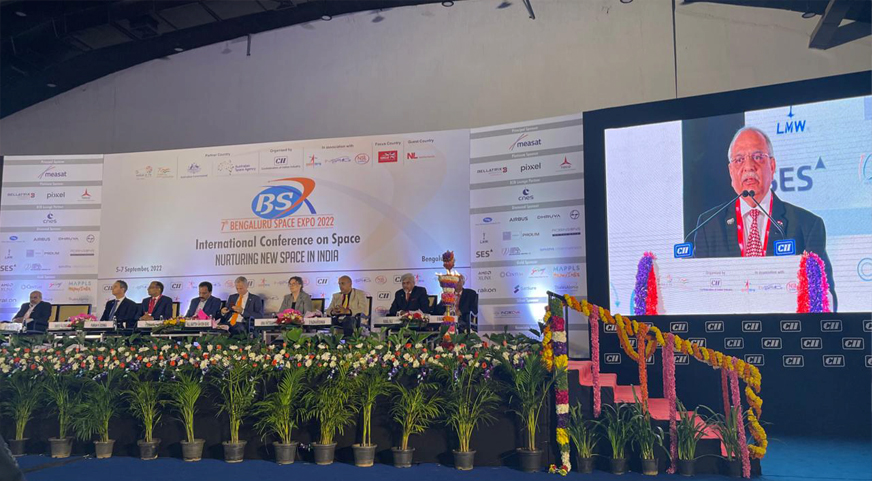
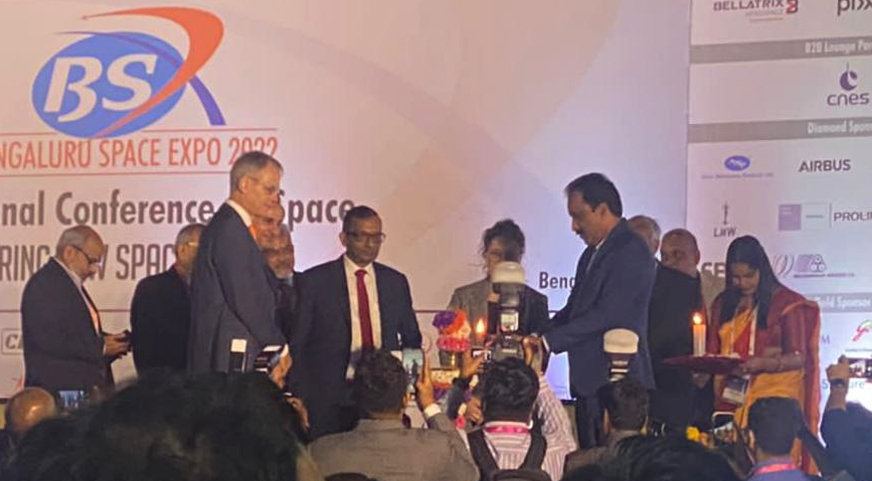
Skyroot Aerospace has become the the first private Indian space launch vehicle company to sign an MOU with Indian Space Research Organisation (ISRO) to access the facilities and expertise of the Agency. Talking to Financial Express Online, Pawan Kumar Chandana, Co-Founder & CEO, Skyroot Aerospace Pvt. Ltd., said, “The access to the facilities and expertise is towards the development and testing of subsystems/systems of Space Launch Vehicles.”
“In addition to the technical support from ISRO, other agencies such as IN-SPACe have accelerated support in terms of policy and regulatory issues, thereby creating a harmonious level playing field for the new space ecosystem in India,” he added.
According to Pawan Kumar Chandana, CEO, “Skyroot is winner of the ISRO’s ANIC-ARISE 1.0 programme which was announced in 2020 and has undertaken the research and development of propulsion.”
The company is all set to cater to the growing demand from the global small satellite market.
Sharing details about his company’s involvement with other agencies/companies across the globe, he says that not only the Indian Government but other national governments as well are encouraging and supporting the new space ecosystem.
“Besides, Skyroot Aerospace being a private company is exploring and has received good traction globally which includes agreements with companies such as Hex20 (Australia), Innova Space (Argentina), Ride (France), ConnectSAT (France) amongst others which focus on launching their payloads to various orbits, collaborate on development of technology and contribute towards development for space and ground-based applications.”
To ensure their access to outer space is affordable, reliable and on-demand, his company is connecting with other governments and companies in Africa, South America and other regions globally. And is working closely towards the development of space capabilities in these countries.
In an earlier conversation with Financial Express Online, Pawan Kumar Chandana, Co-Founder and CEO of Skyroot had said that ISRO has offered great support and with an agreement in place the company is working closely for the launching and testing requirements.
This company has been founded by former Scientists of ISRO, with 70+ rocket engineers and their cumulative experience of 500+ years in the rocket industry. The company has been actively developing the `Vikram’ series of launch vehicles, and is the first private company to test fire multiple rocket propulsion systems. This series of launch vehicles is named after the founder of India’s space program – Dr Vikram Sarabhai. These rockets built with an all-carbon-fibre structure, have the capability to launch up to 800 kg of payloads to Low Earth Orbit (LEO). So far the three propulsion technologies in Vikram space launch vehicles are done and earlier this year, a full duration test of one of the rocket stages was tested in May. Now the company is getting ready to launch to space this year. How will this help? According to company officials, to reach the stage of a full-fledged commercial satellite launch scale, such a test will help.
Hex20 is delighted to announce the build of a 3U spacecraft for National Central University(NCU) Taiwan with delivery scheduled in 2023 for an IOT mission.
Mr. Lloyd Lopez, CEO of Hex20 said “the Hex20 NX-3I 3U CubeSat bus leverages the spacecraft architecture developed under the ‘INSPIRE’ consortium, of which NCU was a founding member. The NX-3I is one of the most cutting-edge 3U platforms with space heritage and competitively priced in the international market”. The spacecraft will be integrated at Hex20 facilities in Adelaide and controlled from NCU facilities in Taiwan.
Mr. Lopez added “HEX20 provides turnkey satellite mission solutions designed and delivered according to customer requirements. The modular and scalable buses can support missions for commercial and defence applications. Hex20 currently working with its partners including University of Adelaide to build up sovereign capability within South Australia”.
Prof Loren Chang from NCU stated “The Taiwan government has identified space technology as a key sector for national development. Low Earth Orbit satellites for communications and IoT being identified as national priorities”.
“The spacecraft will carry an NCU developed Automatic identification system (AIS) payload that can be used for maritime tracking, as well as data collection from scientific buoys developed and deployed by NCU for meteorological and oceanographic observations,” said Prof Chang.
NCU has a long history stemming from Taiwan’s first forays into space science following participation in the International Geophysical Year in 1957. NCU was the first university in Taiwan to establish a Department of Space Science and Engineering. The University has been working to develop a small satellite program for educational, scientific, as well as technology test platforms.